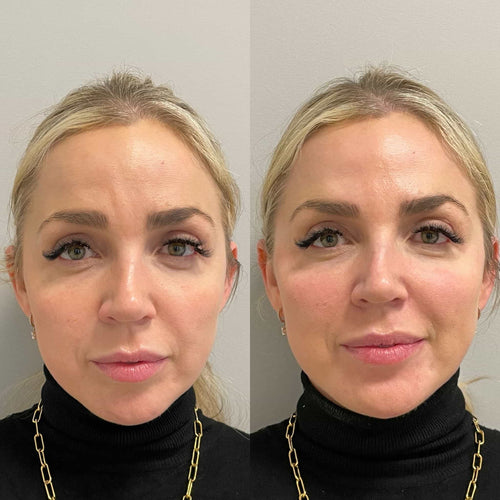What Happens If I Drink After Lip Filler
Get Started with a Dermal Filler Consultation with Dr. Laura Geige
Immediate Effects
Swelling and Bruising
Drinking alcohol after lip filler treatment can potentially exacerbate some immediate effects like swelling and bruising.
Alcohol is a known vasodilator, meaning it widens blood vessels. This increased blood flow to the treated area can intensify swelling and make bruising more prominent.
Furthermore, alcohol can impair your body’s ability to heal and can thin the blood, potentially increasing the risk of bleeding during and after the procedure.
It’s generally recommended to avoid alcohol for at least 24-48 hours after lip filler treatment to minimize these side effects and promote optimal healing.
Consult Dr. Laura Geige for Dermal Fillers at It’s Me and You Clinic
Alcohol’s Impact on Blood Vessels
Alcohol consumption can have a significant impact on blood vessels, both immediately and in the long term.
Here’s a breakdown of alcohol’s immediate effects on blood vessels:
* **Vasodilation:** Alcohol is a vasodilator, meaning it causes blood vessels to widen. This happens because alcohol relaxes the smooth muscles that line blood vessel walls.
* **Increased Blood Flow:** The widening of blood vessels leads to increased blood flow throughout the body.
* **Flushing and Warmth:** The increased blood flow to the skin’s surface causes a feeling of warmth and can lead to facial flushing.
While alcohol doesn’t directly dissolve hyaluronic acid filler, its impact on blood vessels can potentially influence the healing process and affect the final appearance of the filler.
Here’s how:
1. **Swelling:** Vasodilation can increase localized swelling, which can make the filler appear more pronounced or uneven.
2. **Bruising:** Alcohol can thin the blood, making bruising more likely. Bruising around the injection site can obscure the appearance of the filler and delay healing.
3. **Impaired Healing:** Alcohol can interfere with the body’s natural healing processes. This could potentially slow down the integration of the filler into surrounding tissues.
It’s important to note that individual reactions to alcohol vary. Some people may experience more pronounced effects on their blood vessels than others.
Potential for Increased Bleeding
Drinking alcohol after lip filler can have immediate and potential long-term effects on your results and overall well-being.
Immediate Effects:
- Increased Swelling:
Alcohol is a vasodilator, meaning it widens blood vessels. This can lead to increased swelling in the injected area, making your lips appear even larger and more puffy than intended.
- Tenderness and Discomfort:
Alcohol consumption can exacerbate tenderness and discomfort at the injection sites, making the area feel sore and sensitive.
- Blurred Judgement:
Alcohol impairs your judgment and coordination, which can increase the risk of accidentally touching or rubbing the treated area, potentially damaging the filler.
Potential for Increased Bleeding:
- Thins Blood:
Alcohol consumption thins the blood, making you more prone to bleeding. This can lead to bruising and swelling around the injection sites, potentially affecting the appearance of your lips.
- Interferes with Clotting Factors:
Alcohol can interfere with the body’s natural clotting factors, increasing the risk of prolonged bleeding even after minor trauma like needle insertion during lip filler treatment.
It is generally recommended to avoid alcohol for at least 24-48 hours before and after your lip filler appointment to minimize potential complications and ensure optimal results.

Long-Term Concerns
Delayed Healing
Long-term concerns regarding lip fillers are relatively uncommon when proper techniques and products are used by a qualified practitioner. However, some potential long-term effects can arise, especially if complications occur or if filler injections become a regular practice.
One concern is the potential for persistent swelling or asymmetry. If fillers are placed improperly or in excess, they can cause uneven results that may not resolve completely over time.
Another concern is the risk of infection. As with any medical procedure involving needles, there’s a risk of infection if proper sterile techniques aren’t followed.
Additionally, some individuals may experience a granulomatous reaction to certain filler ingredients. This is a body’s inflammatory response to a foreign substance and can lead to the formation of nodules or bumps.
Delayed healing in the context of lip fillers typically refers to prolonged redness, swelling, or bruising after treatment. This can be caused by factors like excessive force during injection, individual variation in healing rates, or underlying medical conditions.
It’s crucial to understand that alcohol consumption before and after lip filler injections can negatively impact the healing process and potentially increase the risk of complications. Alcohol is a known vasodilator, which means it widens blood vessels, potentially leading to increased bleeding and bruising.
Moreover, alcohol can suppress the immune system, making it harder for the body to fight off infection and promote proper healing.
If you experience any unusual or persistent symptoms after lip filler injections, it’s essential to consult your doctor promptly.
Infection Risk
Drinking alcohol after lip filler is generally considered safe, but there are some long-term concerns and infection risks to be aware of.
Alcohol can **thicken your blood**, which may affect the way filler distributes** in your lips and increase the likelihood of **bruising or swelling**. This is because thicker blood doesn’t flow as easily, potentially leading to a less smooth application of the filler.
Furthermore, alcohol can weaken your immune system**, making you more susceptible to **infection**. Any time you have an invasive procedure like lip filler, there’s a risk of infection. Drinking alcohol can increase this risk by impairing your body’s ability to fight off bacteria and other pathogens.
While it’s not advised to drink heavily right after getting lip fillers, moderate alcohol consumption within a few days may not pose a significant risk as long as you follow the aftercare instructions provided by your practitioner.
It’s always best to err on the side of caution and limit alcohol intake following any cosmetic procedure. Consult with your injector if you have any concerns or questions about drinking after lip fillers.
Altered Results
While drinking alcohol after lip filler injections is generally considered safe, there are some long-term concerns and potential alterations in results that should be taken into consideration.
Here’s a breakdown:
-
Dehydration: Alcohol is a diuretic, meaning it increases urine production. This can lead to dehydration, which can affect the way filler is distributed and retained in your lips. It may cause the filler to appear less plump and more uneven.
-
Swelling and Bruising: Alcohol consumption can increase inflammation throughout the body. This can exacerbate any swelling or bruising that already occurs after lip filler injections, potentially extending the recovery period.
-
Reduced Immune Function: Alcohol weakens the immune system. While this doesn’t directly impact filler results, it can make you more susceptible to infections at the injection site.
-
Altered Filler Breakdown: Alcohol may indirectly influence how your body metabolizes and breaks down the hyaluronic acid filler. This could potentially lead to faster degradation of the filler, requiring more frequent touch-up appointments.
It’s important to remember that everyone reacts differently to alcohol. Some individuals may experience minimal effects on their lip filler, while others may notice a more significant impact.
To minimize any potential risks:
-
Avoid drinking alcohol for at least 24-48 hours before and after your lip filler treatment.
-
Stay well hydrated by drinking plenty of water both before and after your appointment.
Recommendations from Experts
Guidance from the American Society of Plastic Surgeons
After undergoing lip filler injections, it’s crucial to follow post-procedure guidelines provided by your plastic surgeon to minimize risks and ensure optimal results.
The American Society of Plastic Surgeons (ASPS) emphasizes avoiding alcohol consumption for at least 24 hours after any cosmetic injection procedure, including lip fillers. Alcohol can increase bleeding and bruising, potentially leading to unevenness or complications with the filler distribution.
Moreover, alcohol is a blood thinner and can interfere with the body’s natural healing process. This can prolong swelling and discomfort after lip augmentation.
Alcohol consumption may also exacerbate any side effects associated with the anesthetic used during the procedure.
Sticking to your plastic surgeon’s post-procedure instructions, including abstaining from alcohol, is essential for a safe and successful outcome with your lip filler treatment.
Advice from Dermatologists
When considering lip filler treatments, it’s crucial to consult with a qualified dermatologist or plastic surgeon. They can assess your individual needs, skin type, and medical history to determine if you’re a suitable candidate for the procedure.
Dermatologists strongly advise against consuming alcohol before or immediately after lip filler injections. Here’s why:
-
Alcohol can thin your blood, which may lead to increased bleeding and bruising during and after the procedure. This can make swelling more prominent and potentially impact the final aesthetic result.
-
Alcohol can interfere with the body’s ability to heal properly. It may delay wound healing and increase the risk of infection at the injection sites.
-
Alcohol can dehydrate you, which is detrimental to your skin health in general and can also exacerbate any swelling or discomfort after lip fillers.
Most dermatologists recommend abstaining from alcohol for at least 24 hours before and after your lip filler appointment. This timeframe allows your body to process the alcohol and minimize potential complications.
Schedule Your Dermal Filler Appointment with Dr. Laura Geige at It’s Me and You Clinic
It’s essential to follow your dermatologist’s post-treatment instructions carefully, including any recommendations regarding alcohol consumption.
Otherwheres Magazine N City Magazine Yummalicious Food Crimson Hill Electric Youth Magazine
- Why Athletes Are Drinking THC Beverages - November 1, 2025
- What Is The Aftercare For Nasolabial Fillers? - October 30, 2025
- What Age Can You Get Lip Filler - October 29, 2025
